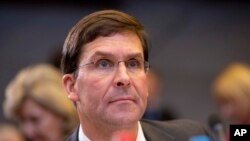U.S. Defense Secretary Mark Esper said on Monday North Korea would
likely carry out unspecified tests if they "don't feel satisfied" amid fears the two countries could return to the collision course they had been on before launching diplomacy.
Tension has been rising in recent weeks as Pyongyang has conducted a series of weapons tests and waged a war of words with U.S. President Donald Trump.
"We have seen talk of tests. I think that they will be likely if they don't feel satisfied," Esper told reporters traveling with him from Europe back to Washington.
He did not provide details on what type of tests may be likely but added he was hopeful about diplomatic efforts.
Experts say North Korea could restart intercontinental ballistic missile (ICBM) testing suspended since 2017, a move that would be seen as highly provocative in Washington.
"I've been watching the Korean Peninsula for maybe a quarter of a century now. So I'm familiar with their tactics, with their bluster and I think we need to get serious and sit down and have discussions about a political agreement that denuclearizes the Peninsula," Esper said.
The U.S. special envoy for North Korea, Stephen Biegun, urged Pyongyang on Monday to return offers of talks, dismissing leader Kim Jong Un's year-end deadline while highlighting Washington's willingness to discuss "all issues of interest."
"I would like to remain an optimist that we can keep moving
forward with regard to negotiations because the alternate is not
a positive (one)," Esper added.
On Sunday, state media said North Korea had successfully conducted another test at a satellite launch site aimed at "restraining and overpowering the U.S. nuclear threat," a second such test in a week. North Korea has put forward a year-end deadline for the United States to drop its insistence on unilateral decentralization by Pyongyang.
In a bid to help diplomatic efforts with North Korea, the United States and South Korea have postponed or scaled down a number of joint military drills.
Asked whether military readiness could be maintained while relying heavily on computer-simulated exercises, Esper said he was confident that readiness was high.
There were a number of things the United States could do with regard to training that fit between large-scale exercises and computer-simulated ones, he added.









